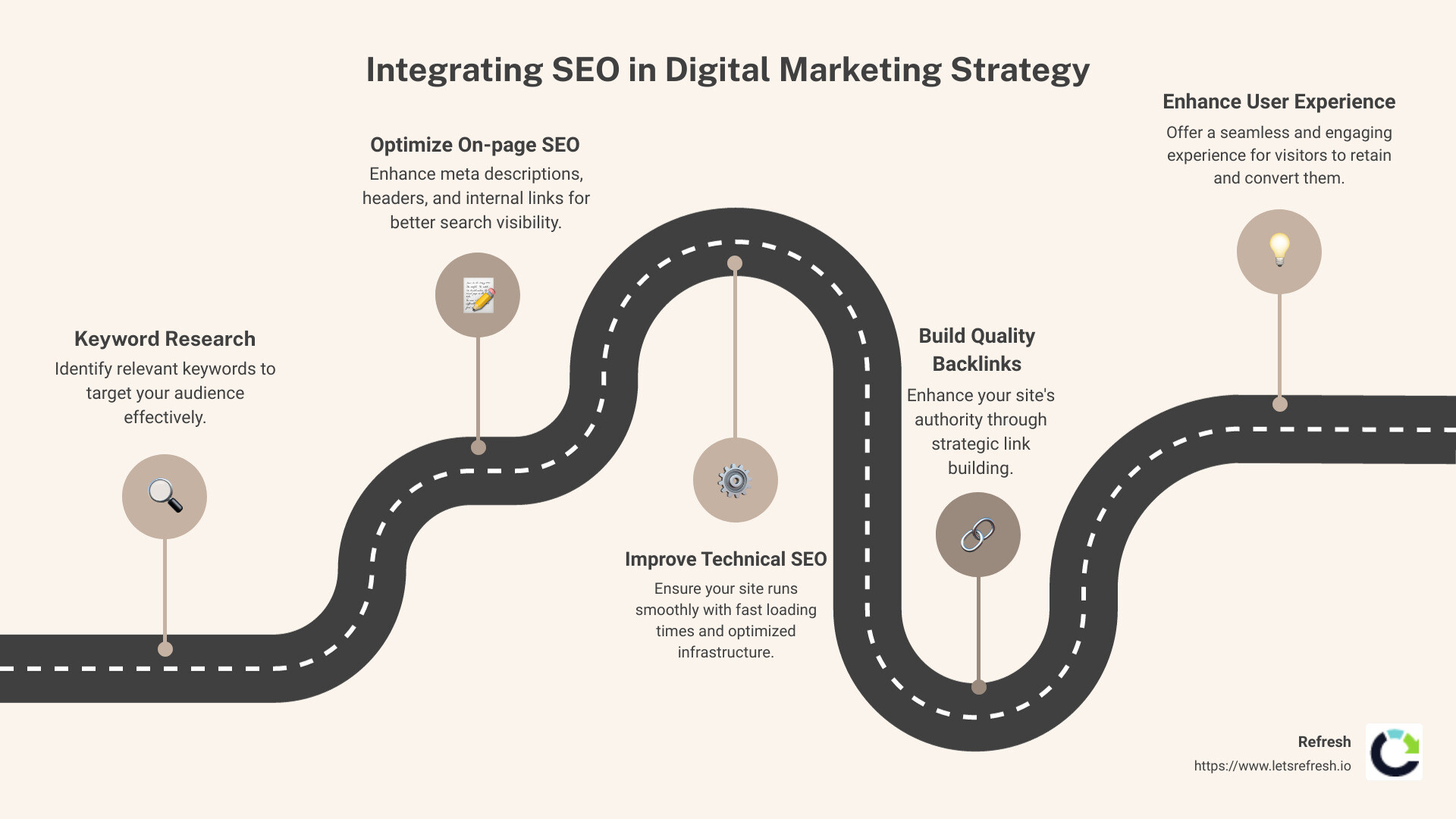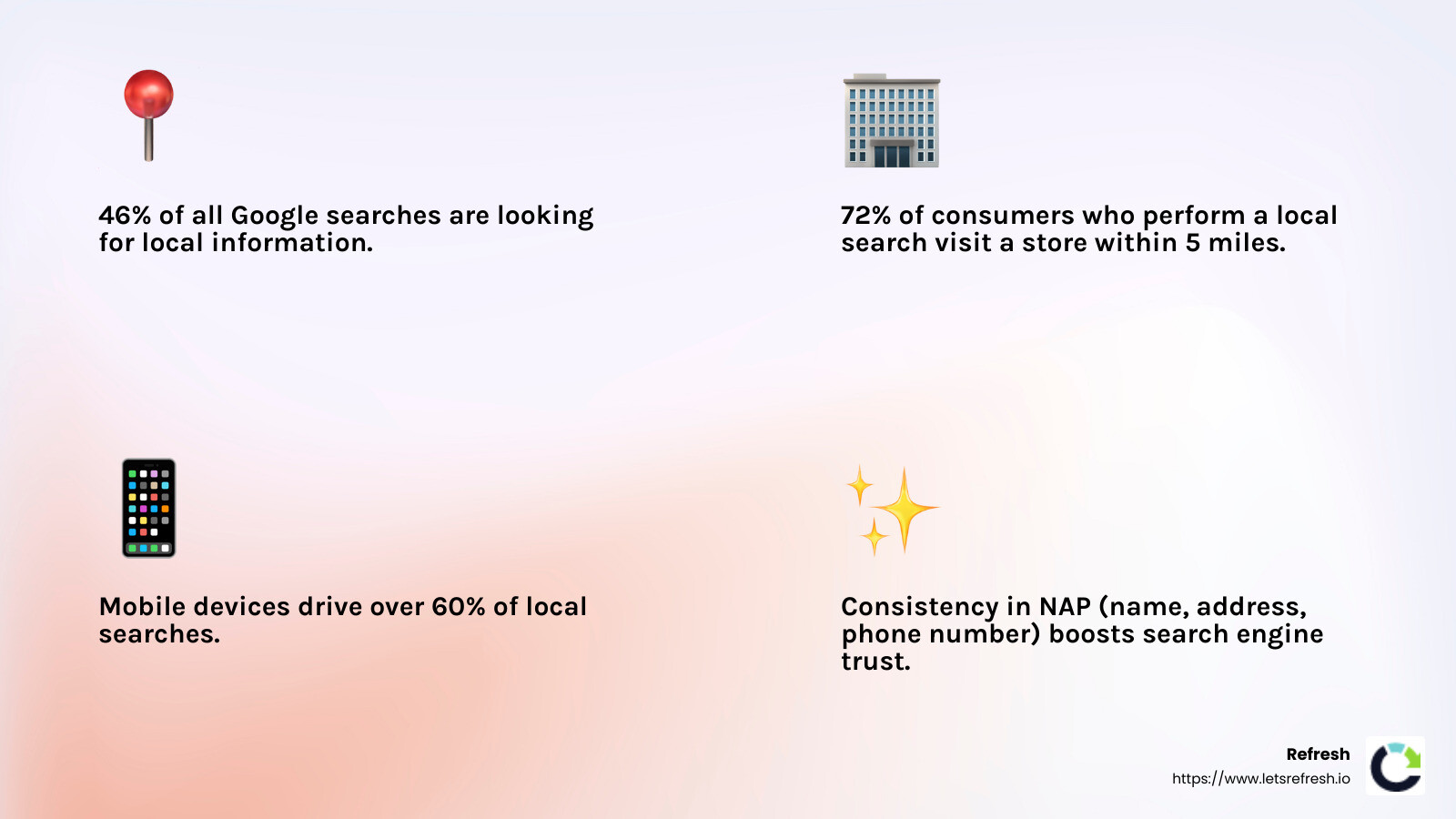How to use seo in your digital marketing strategy: To effectively integrate SEO into your digital marketing strategy, focus on proper keyword research, optimize on-page SEO elements like meta descriptions and headers, leverage technical SEO for site speed, and build quality backlinks to strengthen your site's authority.
Search Engine Optimization (SEO) is the backbone of a strong digital marketing strategy. By boosting your website’s visibility on search engine results pages, SEO connects your business with potential customers who are actively searching for your services or products online. In today’s digital world, understanding how to use seo in your digital marketing strategy is crucial for attracting more visitors and enhancing your brand's online presence.
Let's break down the essentials. Keyword research helps you tap into language people actually use when searching. On-page SEO like title tags and internal links helps search engines understand your content. Technical SEO ensures your site runs smoothly, while backlink building improves your online reputation. All these factors work together, ensuring that your digital marketing strategy isn't just visible, but truly engaging and effective.
My name is Alexander Palmiere, founder of Refresh Digital Strategy. With experience in digital marketing and SEO, I’ve helped numerous businesses build stronger online presences. Join me as we explore how to use seo in your digital marketing strategy for maximum impact.

Understanding SEO
SEO, or Search Engine Optimization, is a multifaceted approach that improves a website's visibility and ranking on search engines. Understanding its different types can help you effectively integrate SEO into your digital marketing strategy.
SEO Types
There are four main types of SEO: on-page SEO, off-page SEO, technical SEO, and local SEO. Each type plays a unique role in boosting your website's performance and visibility.
On-Page SEO
On-page SEO involves optimizing individual web pages to rank higher and earn more relevant traffic. This includes elements like title tags, meta descriptions, headers, and image alt text. By focusing on on-page SEO, you ensure that search engines and users can easily understand your content.
Example: A company optimizing its blog post titles with targeted keywords can improve its chances of appearing in relevant search results.
Off-Page SEO
Off-page SEO refers to actions taken outside of your website to impact your rankings. This includes building backlinks from reputable sites, which signal to search engines that your content is authoritative and trustworthy.
Example: A business collaborating with industry influencers to gain backlinks can boost its credibility and search engine ranking.
Technical SEO
Technical SEO focuses on the backend of your website, including site speed, mobile optimization, and secure connections (HTTPS). Ensuring your site is technically sound helps search engines crawl and index your site effectively.
Example: Compressing images to improve page speed can improve user experience and improve your site's ranking.
Local SEO
Local SEO is crucial for businesses targeting local customers. It involves optimizing your online presence to attract more business from relevant local searches. This includes managing your Google Business Profile and ensuring your business information is consistent across online directories.
Example: A local bakery optimizing for "best bakery near me" can attract more foot traffic from nearby customers.
Understanding these SEO types is key to crafting a robust digital marketing strategy. Each type contributes to your overall SEO efforts, helping you reach your target audience more effectively. Next, we'll dig into advanced SEO techniques that can further improve your online presence.
How to Use SEO in Your Digital Marketing Strategy
Establish Your Target Audience
To effectively integrate SEO into your digital marketing strategy, start by understanding your target audience. Knowing your audience's demographics, interests, and buying habits is crucial. This information helps tailor your SEO efforts to match what your potential customers are searching for. For example, if your target audience consists of young professionals interested in tech gadgets, your content and keywords should reflect those interests.
Conduct Keyword Research
Keyword research is the backbone of any successful SEO strategy. Focus on identifying long-tail keywords that are specific and less competitive. These keywords often capture searchers with a clear intent to purchase. Use tools like Google Keyword Planner or SEMrush to find these valuable terms. Understanding search intent—whether users are looking to buy, learn, or compare—is vital for choosing the right keywords.
Invest in High-Quality Content
Content is king, as they say. Create content that aligns with your audience's needs and interests. Focus on content topics that address user intent and provide real value. Determine the content frequency that keeps your audience engaged and coming back for more. High-quality content not only improves user experience but also boosts your site's authority in the eyes of search engines.
Develop a Link Building Plan
Building a network of backlinks is essential for improving your site's credibility. Focus on acquiring links from reputable sites within your industry. Additionally, use internal links to guide users through your content and improve site navigation. Engage in content outreach by sharing your valuable content with other sites or influencers to earn those crucial backlinks.
Optimize Site Speed
A fast-loading website is critical for both user satisfaction and SEO. Use page speed tools like Google PageSpeed Insights to identify areas for improvement. Techniques like image compression and minimizing redirects can significantly improve your site's speed. A faster site leads to better user engagement and higher search rankings.
Adapt for Mobile
With mobile-first indexing, ensuring your site is mobile-friendly is more important than ever. Implement a responsive design that adapts to any device. Focus on thumb-friendly elements to make navigation easy for mobile users. By prioritizing mobile optimization, you improve the overall user experience and improve your search engine rankings.
Improve User Experience
A user-friendly design is essential for keeping visitors engaged on your site. Ensure easy navigation with clear menus and intuitive layouts. Use multimedia elements like videos and images to enrich content. Make sure CTA buttons are prominent and easy to find. Include accessible contact information to build trust and encourage user interaction. A seamless user experience not only satisfies visitors but also positively impacts your SEO performance.
By focusing on these elements, you can effectively use SEO to improve your digital marketing strategy, attract your target audience, and achieve your business goals. Next, we'll explore advanced SEO techniques that can further boost your online presence.
Advanced SEO Techniques
Local SEO
For small businesses, local SEO is a game-changer. It's about making sure your business shows up when people nearby search for services you offer. Start by optimizing your Google Business Profile. Keep your business name, address, and phone number consistent across all platforms. This consistency helps search engines trust your information, which boosts your visibility.
Incorporate local keywords into your content. These are terms that include your city or region. For instance, if you own a bakery in Brooklyn, use phrases like "best bakery in Brooklyn." Also, aim to get local citations—mentions of your business on local directories and websites. These citations act like votes of confidence for your business.

YouTube SEO
YouTube isn't just a video platform; it's a powerful search engine. To optimize your videos, focus on video titles that are clear and include keywords. Write descriptions that provide context and also incorporate relevant keywords. Thumbnails should be eye-catching—think of them as a mini-poster for your video. Keep an eye on video length; while there's no perfect length, ensure your content is engaging throughout. Optimized videos can rank well on Google and drive traffic to your site.
Guest Posting
Some say guest posting is outdated, but it's still a robust strategy. By writing for other reputable sites, you expose your brand to new audiences. This content outreach not only brings in new readers but also builds your brand exposure. Accepting guest posts on your site can also attract traffic from the guest writer's followers. It's a win-win for audience engagement and SEO.
Social Media Integration
Social media and SEO work hand-in-hand. Social signals—likes, shares, and comments—can indirectly influence your search rankings. When your content is shared widely, it increases visibility and can lead to more backlinks. Encourage content sharing by making it easy for users to share your posts. Track engagement metrics to understand what resonates with your audience and refine your strategy accordingly.
By leveraging these advanced techniques, you can improve your digital marketing strategy and boost your online presence. Next, we'll tackle some frequently asked questions about integrating SEO into your marketing efforts.
Frequently Asked Questions about SEO in Digital Marketing
How does SEO fit into a marketing strategy?
SEO is the backbone of a successful digital marketing strategy. It helps improve your website’s visibility on search engines, which is crucial for attracting organic traffic. When your site ranks higher in search results, more people are likely to visit, leading to increased conversions.
An effective SEO strategy involves understanding your target audience, conducting thorough keyword research, and optimizing your content to meet user intent. By integrating SEO with other marketing efforts, like content and social media marketing, businesses can create a cohesive approach that drives traffic and improves brand visibility.
What are the top SEO techniques in digital marketing?
Several SEO techniques are essential for boosting your digital marketing efforts:
- Keyword Research: Identify long-tail keywords that match user intent. Tools like Semrush can help you find less competitive terms that are easier to rank for.
- High-Quality Content: Content is king. Create engaging, informative content that answers your audience's questions and incorporates relevant keywords naturally.
- Local SEO: Optimize for local searches by ensuring your business information is consistent across directories. Use local keywords to attract nearby customers.
- Site Speed: Fast-loading pages improve user experience and are favored by search engines. Use tools to compress images and reduce redirects to improve speed.
- Mobile SEO: With mobile-first indexing, ensure your site is responsive and easy to steer on mobile devices.
- YouTube SEO: Optimize video content with relevant titles, descriptions, and thumbnails to improve visibility on both YouTube and Google.
- Guest Posting: Write for reputable sites to reach new audiences and gain high-quality backlinks.
What role does SEO play in digital marketing?
SEO plays a pivotal role in enhancing your website's visibility and attracting the right audience. By optimizing your site structure and technical elements, you ensure search engines can easily crawl and index your site. This boosts your chances of ranking higher in search results.
SEO is also vital for content optimization. It ensures your content is not only relevant but also authoritative, which can lead to increased traffic, leads, and ultimately, sales. By consistently applying SEO best practices, businesses can maintain a competitive edge in the digital landscape.
By understanding these aspects of SEO, you can effectively integrate it into your digital marketing strategy and achieve long-term success. Up next, we'll dig into advanced SEO techniques that can further improve your online presence.
Conclusion
At Refresh, we know that integrating SEO into your digital marketing strategy is not just a quick fix—it's a long-term investment in your business’s future. SEO is a powerful tool that, when used effectively, can drive significant growth and success.
Long-term SEO Benefits
SEO offers ongoing benefits that extend far beyond a single campaign. Once you establish a high-ranking position in search results, you can continue to attract organic traffic without ongoing costs. This sustained visibility can lead to increased conversions and revenue growth over time.
Moreover, SEO helps build brand credibility. As your website appears consistently in search results, potential customers recognize your brand as a reputable authority in your industry. This trust can translate into customer loyalty and repeat business.
Continuous Optimization
SEO is not a one-and-done task. It requires continuous optimization to adapt to changing algorithms and user behaviors. Regularly updating your content, refining your keywords, and enhancing your technical SEO are crucial for maintaining and improving your search rankings.
By using tools to analyze your website's performance, you can make informed decisions and adjustments to your strategy. Continuous optimization ensures your site remains competitive and aligned with the latest SEO best practices.
Expert Support
Partnering with an experienced digital marketing agency like Refresh can provide the expertise and support you need to excel in SEO. Our team specializes in crafting custom SEO strategies that align with your business goals. We focus on both technical SEO and high-quality content to drive organic traffic and improve user experience.
Our commitment to long-term partnerships means we’re here to support your ongoing success. With our expert Webflow support and continuous optimization efforts, your website can stay at the forefront of search engine results.
Ready to lift your digital presence with expert SEO strategies? Contact Refresh today and let us help you achieve your business goals through effective SEO integration.
By embracing the power of SEO, you can open up unparalleled growth and prosperity. Let's make your success story unfold together.



.avif)
.avif)

